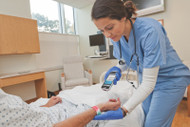Are Your Clinical Mobility Solutions Reliable?
Published by Mark Cramer on 18th Mar 2020
Healthcare devices have had such a positive impact in hospitals, that 71% of hospitals have claimed to identify mobile communications as priority, especially as data connectivity and communication matter to ensure that every patient is given the highest quality of care in an efficient and timely manner.
Mobile devices are becoming more popular in healthcare industries, so you may already have integrated this technology solution, but how can you ensure that your current mobility solutions are truly safe, secure and reliable enough to provide the best patient care?
Mobile technology can either help or hurt your cause – if you’re not using a mobility solution that’s specifically designed for healthcare professionals and applications, you will find that clinical mobility can reduce productivity, disrupt patient interactions, and potentially lead to mis-informed care decisions that result to unnecessary medical tests or treatments.
Consumer devices tend to have a shorter lifecycle in hospital environments due to constant hazard exposures and disinfectant requirements. This could mean more frequent device replacement and the deployment of new devices. Device failures could then lead to breakdown in communications among care team members, and ultimately result in disruptions to patient care.
The ability to help improve clinician productivity and reduce preventable errors at the point of care can prove to be one of the most valuable “benefits of ownership”, which is one of the main reasons why you should ensure that you are using a purpose built clinical mobile device, that ourselves and Zebra Technologies can supply.
Hospital-grade handheld devices are known to be more dependable. Reliable clinical mobility solutions equipped with the right tools is key to effective care actions, and eliminates the risk of dangerous workarounds that can be detrimental to patient outcomes. Zebra’s clinical devices can be used without having to take off latex gloves to give your healthcare workers the extra few seconds needed to save a life in a critical situation, as can giving them devices with Push-to-Talk or one-button dial capabilities to allow for immediate consultation with the required colleagues.
Consumer devices can’t tolerate the constant contact with industrial strength sanitizing chemicals required in healthcare. Many consumer mobiles take clinicians 10 minutes to disinfect compared to the 1 minute it takes to thoroughly disinfect the purpose-built clinical smartphone. The time burden isn’t the biggest concern though, it’s the increased likelihood that clinicians will skip steps in the cleaning process. It has been reported that 94.5% of healthcare workers mobile phones contained bacterial growth, some of which are known to cause nosocomial infections. Clinical smartphones are intentionally designed with smooth covered housing surfaces to minimize bioburden build-up that would otherwise take place in crevices and seams with consumer devices. The design of Zebra’s TC52-HC Touch Computer was taken a step further to utilize only disinfectant-ready, non-nylon-based medical grade plastics that can be disinfected with over 30 approved and publicly documented healthcare cleaning agents.
Consumer devices have also proven to be a difficult for IT teams to monitor, manage and secure. Zebra Technology’s Enterprise Mobility Management (EMM) platforms and Original Equipment Manufacturer (OEM) device management make it simple to configure, deploy, maintain and recover, and even lockdown healthcare devices remotely. Operating System (OS) version control is critical to maintaining a secure mobility solution, particularly in healthcare where protecting patient privacy is a top priority. Consumer device management – including the timing of an OS update – is often dictated by MDM solutions, which means there could be delays.
Data security is complex, and it can be easy to violate regulations if you don’t have the right encryptions. Zebra integrates multiple methods of security and uses a number of tools to harden Android OS devices used in data-sensitive environments such as healthcare. Our devices have FIPS 140-2 validated cryptographic modules to maintain patient healthcare information confidentiality, as well as cybersecurity prevention tools that help to prevent software bug hacks. In clinical settings, we know that multi-user log-on is essential to allow devices to be used by multiple care team members in a shift setting, so Zebra have allowed you to fully control what each worker can access, via log-on credentials, which isn’t necessarily possible with consumer devices. As well as the ability to restrict user application access to hardware (such as integrated camera, GPS and Bluetooth) as well as the built-in web browser or an email client – another “benefit of ownership” with purpose built clinical smartphones.
A reliable clinical mobility solution equipped with the right tools is key to effective care actions, eliminates risk and saves lives. Nemours Children’s Health System reported that adverse reactions to blood transfusions had been detected and quickly stopped due to the early detection and better staff communication with their purpose built mobile solutions.
You can discover more about the Zebra TC52-HC Touch Computer here.
For more information about our Healthcare Solutions, feel free to contact us.
